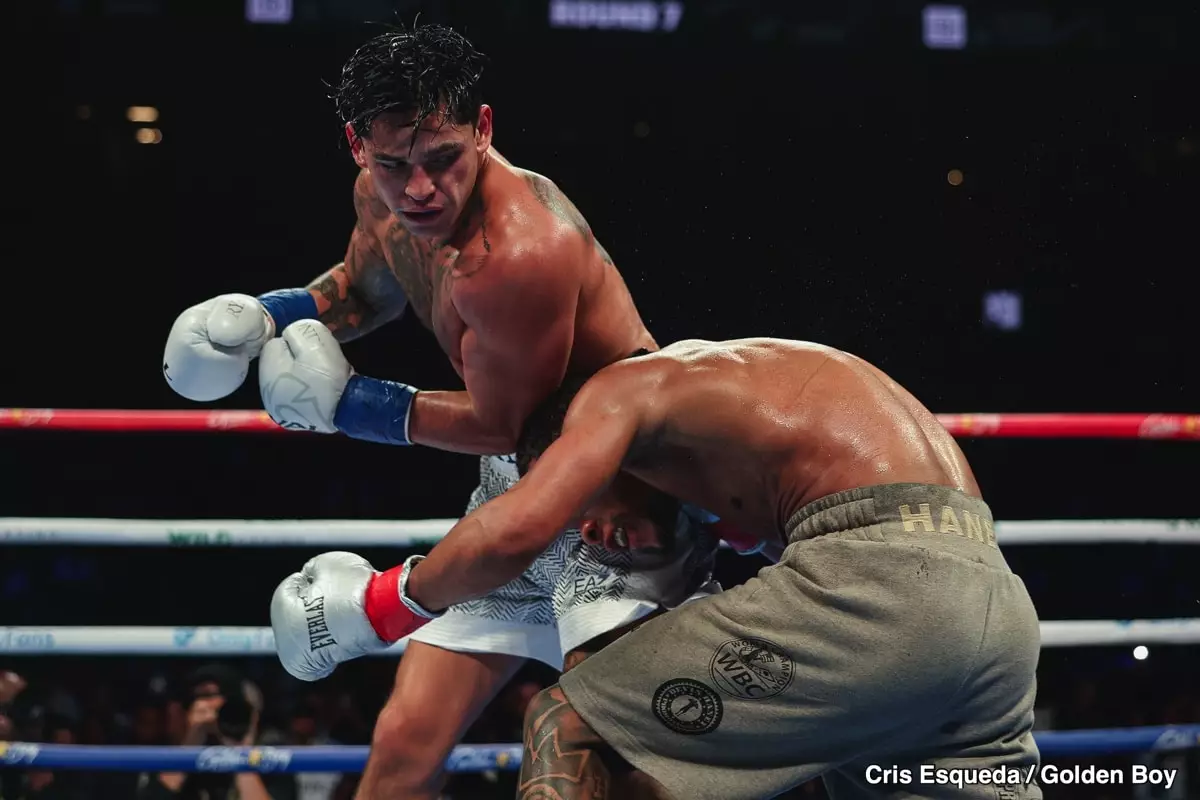The world of professional boxing is fraught with drama, and the recent developments surrounding Devin Haney’s legal actions against Ryan Garcia have thrown him into a whirlwind of controversy. Haney’s decision to file a lawsuit citing battery, fraud, and unjust enrichment following a disappointing loss to Garcia has sparked significant backlash from fans and fellow athletes alike. Chris Algieri, a respected voice within the boxing community, has weighed in on the situation, suggesting that Haney’s reputation is at risk and that action must be taken to regain credibility in the sport.
The fallout from Haney’s lawsuit highlights the precarious nature of an athlete’s public image. In today’s digital age, social media serves as a magnifying glass, amplifying opinions and scrutinizing the actions of public figures. Algieri argues that Haney’s current predicament is a reflection of how fan perception can shift drastically after a major defeat. Instead of rallying behind their champion, fans have taken to platforms like Twitter to express their disappointment, viewing the lawsuit as a sign of weakness rather than a justified response to an unfair encounter.
Haney’s situation raises questions about the expectations placed on athletes after a loss. Traditionally, boxers are expected to rebound and reclaim their status with resilience and determination. By opting for a legal route instead of stepping back into the ring, Haney risks being painted as someone who cannot face defeat head-on. This image may tarnish his reputation, making it difficult for him to secure high-profile fights in the future. Algieri’s perspective suggests that Haney needs to focus on restoring his image through performance rather than legal disputes.
One critical point raised by Algieri is the timing of Haney’s lawsuit. In the aftermath of any athletic contest, emotions run high; however, responding to a loss by initiating a legal battle can be seen as an overreaction. Algieri suggests that Haney should have waited until he had a few stellar wins under his belt to bolster his position before pursuing legal action. Doing so might have solidified his argument and helped him regain the respect of fans and critics alike.
In boxing, the landscape changes quickly; a fighter’s worth is often determined by their most recent performances. Since Haney has not yet returned to the ring following his loss, questions about his competitive viability remain. If he is to fight at welterweight, there are numerous formidable opponents who would likely present significant challenges. Algieri implies that placing Haney in a ring with top-tier fighters could rapidly redefine his reputation, and awaiting legal proceedings may no longer be in his favor.
The implications of Haney’s lawsuit extend beyond his immediate reputation. As Algieri notes, the financial aspects of Haney’s career are now at risk. The purse bid for Haney’s upcoming fight against Sandor Martin yielded disappointing results, highlighting how his loss and subsequent lawsuit have negatively affected his marketability. With fewer promoters willing to invest in Haney, the fiscal repercussions are likely to be extensive, jeopardizing his earnings in what is a high-stakes industry.
Moreover, Haney’s decision not to pursue the fight with Martin, despite having the opportunity, illustrates a further departure from conventional expectations. The chance to defend his former WBC light welterweight title could have offered him a platform to showcase resilience and skill, allowing him to combat his detractors directly. Instead, the choice to remain inactive signals a lost opportunity to reshape his narrative; he risks becoming irrelevant in a sport that demands constant visibility and action.
Amidst this tumult lies a broader discussion about the regulatory framework in boxing, specifically regarding performance-enhancing drugs (PEDs) and weigh-ins. As Algieri emphasizes, a cohesive and robust commission is essential for the integrity of the sport. The absence of stringent regulations allows individuals to exploit loopholes, which can distort competition and endanger the health of fighters.
The boxing community has long debated the necessity of a unified commission to oversee issues like PED testing and weight management. Addressing these concerns is crucial for maintaining transparency and fairness, ultimately fostering a healthier environment for athletes. Until such measures are implemented, the cycle of controversy, lawsuits, and damaged reputations may continue to plague the sport.
The drama surrounding Devin Haney’s legal battles serves as a cautionary tale. As he navigates the tumultuous aftermath of his loss, it is essential for him to refocus on what truly matters: reclaiming his place in the ring and restoring his image through performance and resilience. While the road ahead may be challenging, only time will tell whether Haney can rise to the occasion or remain ensnared in a cycle of controversy and criticism.

